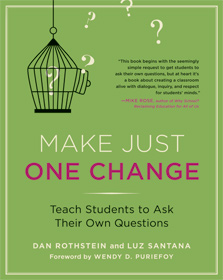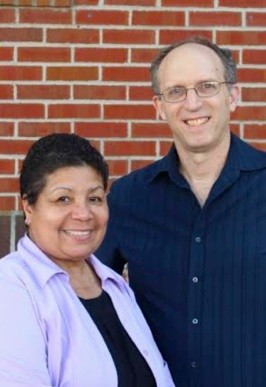“…this was clear evidence that the QFT was a process that students viewed as an authentic and effective tool for their learning, not just something that their teacher was making them do.”
In our last weekly post from the field, educator Robert Welch describes how his students embrace the Question Formulation Technique and use it to drive their learning. In this post, he describes how integrating the Question Formulation Technique into his Socratic Seminars and Literature Circles puts the thinking or “heavy lifting” in the hands of students and completely changes the dynamics as students are deeply engaged in critical thinking and his teaching is reinvigorated.
by Robert Welch
After that experience, I realized that the format of Socratic Seminar was well-suited to prompt students to push each other to question and often rethink ideas. The infusion of an audience that could respond to each other had great potential to increase student motivation, the immediacy and salience of feedback, and the quality of students’ questions and thinking. Going forward, Socratic Seminar would be an important component of the QFT. I wanted to find a way to translate some of its qualities into small group work. Conversely, I wanted students to do a little more thinking and legwork before we reached the Socratic Seminar stage, with the conviction that more frontloaded work would elevate the quality of the discussion at Socratic Seminar.
Thus, I started scheduling each reading period so that it began with independent work, transitioned to small group work in the form of literature circles, and then culminated with Socratic Seminar. I structured independent work so that students read an assigned chapter of our shared novel Out of the Dust by Karen Hesse and then generated and recorded their questions. They then chose one priority question to bring to their literature circles. In literature circles students posed their prioritized questions and discussed possible responses. After each member’s question had been discussed, they decided which question had yielded the richest discussion, wrote that question on a post-it note, and placed it on the Think Tank according to the level of Bloom’s taxonomy they had decided it fell into. We then came to the rug for Socratic Seminar, in which the questions that the groups had prioritized and posted on the Think Tank were discussed.
In watching some of the video taken of literature circles and Socratic Seminar, what strikes me the most is the questions asked and the conversations students had – even when they are about comprehending basic events and relationships within the story. This is particularly true in literature circles, where students vocalize the questions they develop from the reading and digest what they have read. While as an education watching a video of students arriving at a consensus about details from the story may feel laborious, it’s important to remember that by asking questions and answering them together, it’s really the students who are doing the heavy lifting to understand what they have read. We see it in action and then can analyze it so we can foster that critical thinking and learning experience again. In addition, by working through comprehension issues in literature circles, students were more ready to discuss higher order questions (analyzing, applying, and synthesizing on Bloom’s Taxonomy) when they arrived at the rug for Socratic Seminar.
One of the significant outcomes of having students develop their own questions and push their thinking and their peers’ thinking is the level of discussion that students created. It’s clear by how students passionately agree or disagree with each other’s thoughts, that they really want to understand what they read and share their perspectives with each other. In the middle of the year survey, I asked students to identify the best question that they’d heard/created this year and to identify which part of the school day they’d come across this question. Most students identified literature circles, with Socratic Seminar coming in second. Based on explanations like Kiana* for why that question was the best one they’d asked or heard, “My explore group said a lot about it and they was thinking”, it’s clear that students started to measure the quality of questions by the degree that they prompted deep discussion and thought with their peers. It was intensely gratifying and motivating for students to see that the questions they had come up with could really create great discussions. It was truly something that was coming from them, rather than me the teacher. For some students, particularly those with a greater affinity to social learning, literature circles boosted their engagement and enthusiasm for reading Out of the Dust.
Don’t just take it from me, read what my students had to say:
Taquan* wrote: “It made me more into the book”.
Larry*: “We express more about our questions and answers”.
Nyla*: “Now you can think deeper about other people questions”
Emmanuel* “My partners make me think”
 Robert Welch taught third and fourth grade on the west side of Chicago for five years. During his last two years of teaching, he was a fellow of the Chicago Foundation for Education’s Action Research Leadership Institute. He conducted action research on literacy interventions to engage underachieving male readers, and the Question Formulation Technique’s impact on student learning. Robert documented much of his data and reflections from his action research on a blog: http://maleachievementgap.blogspot.com/ He currently works as an instructional coach for new teachers in the Academy for Urban School Leadership’s network of schools in Chicago.
Robert Welch taught third and fourth grade on the west side of Chicago for five years. During his last two years of teaching, he was a fellow of the Chicago Foundation for Education’s Action Research Leadership Institute. He conducted action research on literacy interventions to engage underachieving male readers, and the Question Formulation Technique’s impact on student learning. Robert documented much of his data and reflections from his action research on a blog: http://maleachievementgap.blogspot.com/ He currently works as an instructional coach for new teachers in the Academy for Urban School Leadership’s network of schools in Chicago.




Speak Your Mind